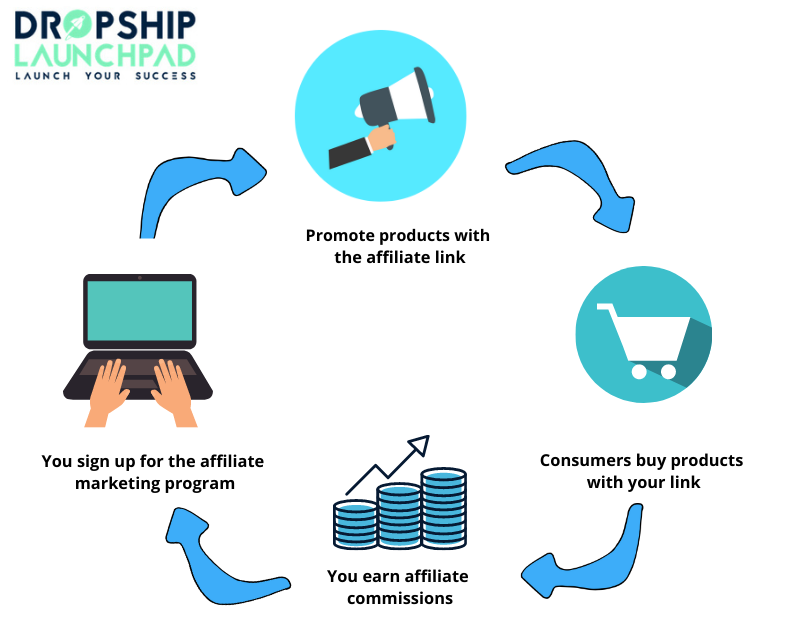Dropshipping Vs. Affiliate marketing: which is better? If you’re just starting, it’s hard to decide if you should go down the affiliate marketing route or the dropshipping one. However, here are a few differences between these two methods that might help you decide!
As you can see, there are many different ways people have found to generate income for themselves. The most popular two ways are dropshipping and affiliate marketing. Both become trendy because they don’t require much money and are easy to set up. Both methods, however, both business models have their pros and cons. This article will focus on which is better between dropshipping and affiliate marketing.
Dropshipping: What is It?

Dropshipping is the process of selling goods by shipping them directly to buyers from a third-party company. In practice, this also means that you never need to carry any items in your own inventory.
As your income grows, you can offer expensive products from other merchants and keep making money without doing stocking or storing. All while getting peace of mind from the online marketplaces that provide safekeeping for merchants and buyers alike.
In this business model or an online retail strategy, e-commerce sellers make their products available to customers through other businesses.
You just need to set up your online store (using Shopify), advertise it on Google AdWords campaigns, etc., get people to buy. And you never have to store the products! This means no extra costs, which is perfect for small businesses that don’t want to spend a lot of money on one product.
How Does Dropshipping Work
In the dropshipping business model, a customer orders from your eCommerce store, the suppliers who supply you with products produce the goods, store them, and ship them to your customers on your behalf.

The process is straightforward:
- A customer orders from you on your online store.
- You inform your supplier about the order and forward the order.
- The supplier completes the order on behalf of you.
Affiliate Marketing: What is It?

Affiliate Marketing is the way in which a company pays a percentage of a sale to the seller of the products they’re marketing through their affiliate website. For instance, an affiliate marketer could receive more or less 10% commission on a $100 customers purchase of their company’s product.
Affiliate marketing, also known as associate marketing, is the process of getting a commission by promoting someone else’s product.
The affiliate marketers might have an online blog devoted exclusively to reviews or recommendations of that company’s products, so when visitors come across their site and make purchases from it, they get paid for having encouraged them to shop with them.
Another example would be someone with a large social media following who endorses products from certain brands by posting photos of themselves using them or mentioning it in some way–maybe even linking an affiliate link directly through social media advertising networks like Twitter and Facebook, where all your followers can see it.
Essentially, you can make money by joining an affiliate program of a brand whose products you regularly use or are already familiar with.
How Does Affiliate Marketing Work
The process of affiliate marketing can be a bit confusing, but it’s also one that is rife with opportunity. In order to understand how an affiliate works and what successful affiliate marketers do for you as well as for themselves in return all we need to understand are the following steps.

The four steps of affiliate marketing are as follows:
- As an affiliate marketer, first of all, you sign up for the affiliate marketing program.
- You choose quality products you’d like to promote (you’ll be provided with a special affiliate link)
- You share your affiliate link to promote products via your own website, blog, social media, YouTube channel, Facebook ads, or any other form.
- A commission is earned when new customers purchases through your affiliate link.
The Pros and Cons of Dropshipping Vs. Affiliate Marketing

Dropshipping Pros:
The entry barrier and risk are low
Dropshipping has become a popular way to sell online. The process is not difficult, and it’s one of the low-risk business models. The entry barrier can be low with a drop-ship online store, making it an excellent choice for new or small companies that want exposure without spending too much money upfront on marketing campaigns because you’re paying only when someone buys something from your site directly instead of having inventory.
Cost-effective startup
Dropshipping is a cost-effective and efficient way for businesses of all sizes to get their products in front of potential customers. Businesses can start dropshipping stores with little starting capital because they don’t need inventory or physical stores to sell what people want at competitive prices- all through dropshipping company websites!
Decrease in overhead
As an entrepreneur, you can enjoy lower overhead costs when you dropship instead of retailing at traditional locations or through wholesalers because you don’t need to stock any inventory – the marketplaces provide safety for buyers & sellers alike. In addition, rent and wages don’t need to be paid since there is no need for rental space!
No need to produce, store, and ship products
Dropshipping is a commerce model where you deal only with selling and let other companies handle the rest of the business. For example, you can start a dropshipping company without paying for any inventory or shipping supplies because that’s all handled by your supplier.
Your customers complete their purchase transaction directly with your suppliers–you never have to take possession of the products.
You can open a dropshipping store pretty quickly
You can open a dropshipping company with little upfront costs besides time, while some retail stores might need thousands of dollars just to open the store. In addition, you don’t have to use your money in a warehouse or store inventory.
Dropshipping is a low-risk business because you only pay for the products you sell and not for ones that are left sitting on your shelves. This allows you to run a more efficient eCommerce operation with no risk of losing unnecessary capital from dead stock.
A wider variety of products to sell
Dropshipping can offer a wider variety of products to choose from being offered by several brands. Also, since this model is so popular among entrepreneurs, there’s a larger market base you’ll be able to reach with your marketing campaigns. For example, you can use influencer marketing on Instagram or Facebook ads to promote your store and its products.
Dropshipping allows you to manage your business with less effort by automating many of the required tasks when retailing goods, such as order processing and fulfillment. This typically makes it possible to grow your business faster by putting more time towards marketing strategies for increasing your brand’s exposure.
Finding suppliers shouldn’t be too difficult as long as you have a product in mind for your store. A Google search for “suppliers” will yield results that are relevant to what you are looking for. You can also use Google Trends or check out eBay to find dropshipping suppliers.
No inventory management
When you dropship, you don’t have to worry about inventory management. You can sell any type of product without worrying about the availability of stock on your end because your supplier’s job is to constantly replenish your inventory with new items.
Improved cash flow
Dropshipping allows you to enjoy improved cash flow because payment isn’t due until the customer receives the order and is satisfied with it. As a result, no money is tied up in stock, and no upfront costs (besides time and energy) are required for your store.
Low Order Fulfillment Costs
Dropshipping is more affordable than retailing, as there are no costs associated with stocking and storing inventory. This makes it possible to provide more competitive prices for customers while making a healthy profit on each sale.
Sell and Test More Products with Less Risk
Dropshipping is an amazing way to sell and test more products with less risk than retail. Dropshipping suppliers can allow you to sell branded items without carrying inventory, meaning you can sell and test more items without fear of negative margins.
Sellers who prefer to build their own brand and want the peace of mind that comes with owning your brand will benefit from dropshipping.
More Opportunities to Earn a Passive Income
You can open a dropshipping store pretty quickly, so if you have the ambition and know-how that it takes to sell products online, you might be able to start your own business with minimal initial capital. Also, since you don’t have to worry about manufacturing or storing inventory, there’s a lot of room to scale your business and earn a passive affiliate income in the process. This can be especially true if you invest some time into marketing, which is what the best drop shippers do to succeed with this business model.
Easy to Scale
Dropshipping is easy to scale because there are no limits to the number of products you can sell. This makes it possible for entrepreneurs with little experience to easily build their own eCommerce empire in a short amount of time.

The Cons of Dropshipping
Not everything is sunny and rosy when it comes to dropshipping. Just like with any model, there are cons you should be aware of:
Customer support is difficult to set up and run
Dropshipping does not provide you with customer support for issues such as shipping, returns, and exchanges–that’s something that has to be coordinated with your supplier(s). You also do not control or customize what they send to your customers, so if you have specific branding or messaging that needs to go out with each product, there is no way to ensure it happens.
Limited ability to customize products
Since dropshipping suppliers are in charge of sending orders directly to consumers after they’re sold, you have little control over the customization of your product.
Price competition is common with drop shippers
Since the market for dropshipping suppliers is so competitive, many suppliers are forced to keep their prices low to stay relevant. Unfortunately, this can lead to lower profits for sellers on a per-sale basis. Also, since you have no control over how your supplier customizes each product, it can be difficult to compete with other stores on branding.
Product quality can be unpredictable
Since dropshipping suppliers can change at any time, you never know what kind of customer service, product selection, and pricing accuracy you’re going to get from one supplier to the next. This is a problem because once a consumer has a bad experience, it’s unlikely they’ll ever return to do business with you again.
Difficult to find suppliers with the right products and prices
It’s common for drop shippers to work with numerous suppliers, each specializing in specific types of brands or categories. This can be time-consuming because it takes a lot of searching around to find good supplier deals that match up well with what you have to offer.
Suppliers are more likely to reject orders when sales volume is low
Since dropship suppliers sell products to you at wholesale prices, they expect a certain level of sales volume from you in order for them to be worthwhile business partners. Unfortunately, if your sales aren’t that great, then it can put pressure on your supplier to maintain their own business–pressure that could potentially lead them to reject orders or provide poor service.
Long shipping timeframes for dropshipped products
Since dropship product suppliers are different from your standard warehouse, where they hold the full stock of every product you sell, this can lengthen shipping times. This isn’t always a deal-breaker, but it is something you should be aware of.
Difficulty in Product Returning Process
It’s often the case that dropshipping suppliers do not accept returns, so this can complicate your product returning process. This problem is compounded when you have to deal with multiple suppliers from different countries.
Affiliate Marketing Business Pros

Affiliate marketing is great for people who are just building an online presence – affiliate links are free to set up, and the only cost comes when a sale is generated.
An affiliate marketing program provides you with full control of your business, so you can run it however you want whenever you want. You need to create content and share your own affiliate program link through your website, social media, email marketing, etc. To be successful in affiliate marketing you must have marketing skills.
Entry is free and open to everybody
Since affiliate marketing is an online business model, there are no barriers to entry. Anyone can get started as an affiliate marketer regardless of their experience or whether they have a physical location or not.
Real-time sale tracking and reporting
By nature, affiliate marketing provides huge amounts of data about each sale you generate. This offers a huge advantage in tracking everything from ad campaigns to customer acquisition rates, affiliate conversion rates, and individual product performance.
Great for generating awareness about a product or service
With the data available about each sale you generate, it’s also easy to see how many people clicked on your ads and whether they went on to make a purchase. This ability to track consumer interest means that affiliate marketing is a great way to generate exposure for your products, even if it does not generate sales directly.
More Flexible Business Arrangements
Affiliate marketing offers more flexible business arrangements than dropshipping because you don’t need large sums of money to start selling a product, nor do you need the supplier’s permission to sell them.
Easy To Scale Businesses by Affiliate Website
By using affiliate marketing, you can easily scale your business because there is no limit to how many offers you can post.
A Great Passive Income Opportunity for Affiliate Marketer
Since affiliate marketing requires very little time to maintain, it is a great opportunity for earning passive affiliate income. You can set up campaigns and then walk away while they run on autopilot, making money without you having to do anything.
No Customer Support Needed for Affiliate Marketers
Affiliate marketing has the advantage of eliminating the need to provide customer support for products or services because the customers are redirected to the supplier’s website and make purchases from there.
The cost-effectiveness
The cost-effectiveness of affiliate marketing is another factor to consider. Affiliate marketing requires an up-front investment of time and effort, but it scales well with little additional effort required after that point.
If you want a business that gives you complete autonomy, Affiliate Marketing might be your best bet.

Affiliate Marketing Business Cons
When you’re just starting, the cons of affiliate marketing can sometimes outweigh the pros! Here are some things to consider:
Affiliate marketing programs follow specific rules
Most Affiliate marketers need to follow specific rules that are set out by the individual affiliate network or program. If you try to change or bend any of these rules, it can cause serious problems for your business.
Competitive industries make it more difficult to make money as an affiliate marketer because many other affiliates are fighting for their piece of the pie.
A crowded market equals lots of competition
The fact that affiliate marketing is so popular means the market is incredibly crowded, which will make it challenging to stand out.
There is so much competition in affiliate marketing that it makes it hard for new affiliate marketers to enter the market successfully. A business takes time to establish itself and get established, which can be frustrating when you start without spending money on advertising.
However, if you are good at picking affiliate offers in line with the current trends, this shouldn’t stop you from being a successful affiliate marketer in this highly competitive platform.
Valuable Customers Can Be Harder To Find
Certain products and services cannot be sold using affiliate marketing because they do not offer enough commission. So, it’s not easy to find valuable customers.
You cannot create your brand awareness
You cannot create your brand value because you are only a channel promoting the brand’s products.
No Control Over Sales Funnel
Since you don’t control the sales funnel, you cannot track which ads and offers work best for your audience.
Low conversion rates
The low conversion rates seen with many affiliate offers may further reduce your income potential. According to research, merchants get a mere 1% conversion rate from affiliate ads with a sales letter.
A successful affiliate marketing campaign relies on the performance of your ad campaigns. So, it’s important to always A/B test advertising materials and optimize them if necessary.
Long Sales Cycle
You also need to wait for a long time before getting paid, even when you do well. For example, you could start seeing sales within 30 days or more; however, affiliate marketers often don’t see payment until they have reached the payout threshold. Which can be anywhere from 45-120 days after making a sale!
The risk of being banned
Banning by the supplier is also a risk when you become an affiliate marketer. You can get banned for violating their terms or not producing enough sales, leaving your income stream to dry up overnight.
Lack of marketing skills
It can be hard to succeed with affiliate marketing if you are not good at marketing. Affiliate marketing is all about driving traffic to your offers. If your traffic is low, conversion rates will also be below.
No recurring sales
Another potential disadvantage of affiliate marketing is that there are no recurring sales. This means that every sale you make has to happen in a single transaction. As a result, if a customer is not happy with your products, they will never come back and purchase from you again. So that it may limit your income potential.
Affiliate links can be hacked and removed.
Last but not least, affiliate marketers need to constantly watch for hacked affiliate links. Hackers can hack into your account and remove your affiliate links. Which may cause you to lose commissions without any warning.
Difference Between Dropshipping Vs. Affiliate Marketing

- Affiliate marketing business is open and free to enter, only requires a domain name & hosting. Dropshipping requires a small investment to set up a Shopify store with products to sell to fulfill orders.
- Affiliate marketing is harder to get started with because there is a learning curve – it requires a lot of research into keywords, headline writing, copywriting, technical know-how to set up conversion-focused web pages & sales funnels.
- Unless your dropshipping store is performing very well, you may not have to spend as much money on ads as affiliate marketers need. If you don’t see good conversions, you will have to adjust your strategy.
- Merchant approval is not required for affiliate marketers. Whereas it is a requirement in dropshipping, making it more difficult to start with this method.
- Dropshipping tends to be better for products that are easier to ship. While affiliate marketing can be used for promoting nearly any product online.
- With drop shipping, you don’t need experience in marketing because it allows you to work as a middleman between customers and product suppliers.
- Dropshipping allows you to create your brand and source the products that you think customers will love. Thus, giving you more control over your income.
- This model is more suitable for short-term projects because you need to constantly change suppliers if their product performance drops.
- Dropshipping has a greater potential for higher profits compared to an affiliate marketing business.
- Affiliate marketing can be time-consuming – you’ll need to constantly monitor your affiliate marketing efforts for effectiveness & keep an eye on conversions to see what’s working.
Dropshipping Vs. Affiliate Marketing: Which is better?
As you can see, the decision of whether to dropship or do affiliate marketing comes down to personal preference. The affiliate model can be rewarding, but it requires more work compared to dropshipping. Dropshipping is better because the business model is much simpler, and it is easier to scale dropshipping. You don’t need a big ad budget or a huge marketing team.
In dropshipping business, you can set your own product prices, which will be higher than affiliate commissions.
There is little risk associated with the dropshipping process. If your product fails, well, there are always new products coming up all the time!
Dropshipping is a great way to build customer loyalty! When people are shopping on your website, they will be more inclined toward purchasing from you again because of the ease with which it was brought about. Whereas an affiliate’s commission depends entirely upon how many sales he/she can make- so if someone does not buy anything at all during his visit, then there would only be time wasted rather than gaining any sort of fee.
Dropshipping is great if you already have an audience familiar with your brand or product line. Therefore, dropshipping can become a much more cost-efficient way of doing business because there’s no need to spend more money.
Dropshipping is also good for people who want to make sales quickly but don’t necessarily have the time or energy for affiliate marketing. Dropshipping only requires someone to set up an online shop and fill it with products they’re already familiar with.
Conclusion
Affiliate marketing and dropshipping are both powerful ways of generating income. The decision is based on weighing the advantages and disadvantages associated with each method before choosing which is right for you.
Of course, both drop shipping and affiliate marketing have their pros and cons. Which one is most appropriate for you will depend on your business goals. Still, hopefully, this article has helped you decide if either of these two methods would best suit your needs!
>> Start your dropshipping business with Shopify here!

 Shopify Dropshipping Business Guide: The Ultimate Solution 2023
Shopify Dropshipping Business Guide: The Ultimate Solution 2023  10 ways to boost free traffic to your dropshipping store in 20232
10 ways to boost free traffic to your dropshipping store in 20232  CSV for dropshipping: What does it entail? Is it worth it?
CSV for dropshipping: What does it entail? Is it worth it?  Dropshipping in 2023: Is Shopify still a good option? (Pros and Cons)
Dropshipping in 2023: Is Shopify still a good option? (Pros and Cons)
it sounds helping.